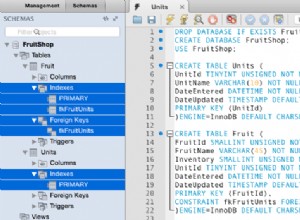El factor decisivo para mí es si llamo a mis columnas de consulta usando * .
Usando bind_result() sería mejor para esto:
// Use bind_result() with fetch()
$query1 = 'SELECT id, first_name, last_name, username FROM table WHERE id = ?';
Usando get_result() sería mejor para esto:
// Use get_result() with fetch_assoc()
$query2 = 'SELECT * FROM table WHERE id = ?';
Ejemplo 1 para $query1 usando bind_result()
$query1 = 'SELECT id, first_name, last_name, username FROM table WHERE id = ?';
$id = 5;
if($stmt = $mysqli->prepare($query)){
/*
Binds variables to prepared statement
i corresponding variable has type integer
d corresponding variable has type double
s corresponding variable has type string
b corresponding variable is a blob and will be sent in packets
*/
$stmt->bind_param('i',$id);
/* execute query */
$stmt->execute();
/* Store the result (to get properties) */
$stmt->store_result();
/* Get the number of rows */
$num_of_rows = $stmt->num_rows;
/* Bind the result to variables */
$stmt->bind_result($id, $first_name, $last_name, $username);
while ($stmt->fetch()) {
echo 'ID: '.$id.'<br>';
echo 'First Name: '.$first_name.'<br>';
echo 'Last Name: '.$last_name.'<br>';
echo 'Username: '.$username.'<br><br>';
}
/* free results */
$stmt->free_result();
/* close statement */
$stmt->close();
}
/* close connection */
$mysqli->close();
Ejemplo 2 para $query2 usando get_result()
$query2 = 'SELECT * FROM table WHERE id = ?';
$id = 5;
if($stmt = $mysqli->prepare($query)){
/*
Binds variables to prepared statement
i corresponding variable has type integer
d corresponding variable has type double
s corresponding variable has type string
b corresponding variable is a blob and will be sent in packets
*/
$stmt->bind_param('i',$id);
/* execute query */
$stmt->execute();
/* Get the result */
$result = $stmt->get_result();
/* Get the number of rows */
$num_of_rows = $result->num_rows;
while ($row = $result->fetch_assoc()) {
echo 'ID: '.$row['id'].'<br>';
echo 'First Name: '.$row['first_name'].'<br>';
echo 'Last Name: '.$row['last_name'].'<br>';
echo 'Username: '.$row['username'].'<br><br>';
}
/* free results */
$stmt->free_result();
/* close statement */
$stmt->close();
}
/* close connection */
$mysqli->close();
Como puede ver, no puede usar bind_result con * . Sin embargo, get_result funciona para ambos, pero bind_result es más simple y elimina parte del desorden con $row['name'] .
resultado_bind()
Ventajas:
- Más simple
- No hay necesidad de meterse con
$row['name'] - Utiliza
fetch()
- No funciona con consultas SQL que usan
*
obtener_resultado()
Ventajas:
- Funciona con todas las sentencias SQL
- Utiliza
fetch_assoc()
- Debe perder el tiempo con las variables de matriz
$row[] - No tan ordenado
- requiere el controlador nativo de MySQL (mysqlnd )




